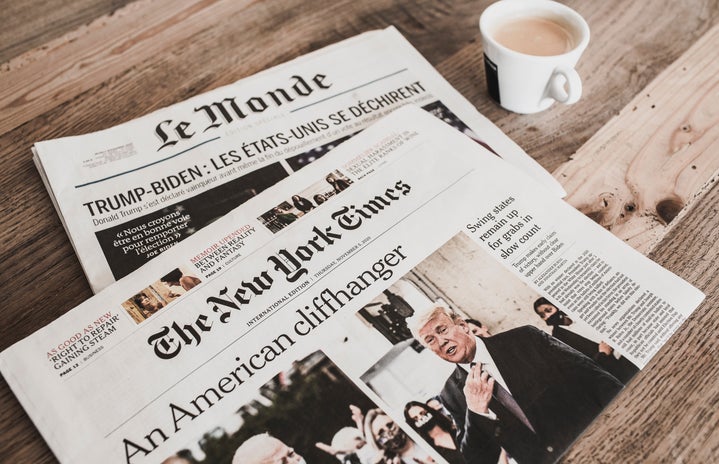According to a survey conducted by the Pew Research Center in 2023, “one-third of adults under 30 regularly scroll TikTok for news,” a statistic that has gone up 255% since 2020. Leading this shift is Generation Z, who have increasingly turned to social media as a method by which they seek the news, particularly news pertaining to politics and current global affairs. Many cite TikTok’s personalized algorithm that puts forward content made by real people whose faces can be seen by the audience as a reason for preferring the app to search engines such as Google — it feels more authentic, more genuine, and isn’t simply information being fed to us by a faceless website.
As a member of Gen Z myself, I will readily admit that I have gotten my news from social media on occasion as well. On Instagram, I follow various activist accounts that synthesize complex political situations into digestible infographics that can be easily shared with friends and followers. Often, I will first hear about a developing event through one of these infographics rather than through an article published in a reputable newspaper. I do believe that receiving information from these types of platforms — be it posts, a story, or a shareable link — is a fantastic aspect of social media. It makes situations that can seem incomprehensible and incredibly complex far easier to understand and digest, and provides us with a space where we can engage with others and learn from their perspectives.
But equally, it is important to recognize that our education cannot begin and end with social media. Although these types of infographics are great for spreading awareness on various issues — particularly ones that are happening in different areas of the world — they also create a sort of placebo effect: The assumption that, just because you’ve read one post or listened to one story about a topic, you’ve learned all that you need to learn and can be considered an expert. To put it bluntly, this simply isn’t true. Drawing from results of a 2020 survey, also conducted by Pew, we find that Americans who receive a majority of their news from social media are “less likely than other news consumers to closely follow major news stories” and, as a consequence, are also “less knowledgeable about these topics.”
Dangerously, Pew makes note in a 2022 study that not only do many adults under the age of 30 rely on social media for news, but they also tend to trust that news the same as they would if it were to come from a national news outlet.
When taken alone, these statistics do not necessarily establish a cause for alarm. Taken together, however, a concerning pattern begins to emerge. The rise of social media as a news platform has been proven to serve as a powerful tool to create engagement with and activism around various movements, but the news being provided to us through social media is taken as gospel when, in fact, it is rife with misinformation. A recent article from the New Yorker highlights one specific issue with relying on social media for news: The content we see on those platforms is more often “what its owner wants you to see.”
While we can — and should — appreciate and take advantage of the benefits social media provides us, from offering a platform to collaborate and connect with like-minded people to globalizing current affairs, we must always remain vigilant of falling into the traps of misinformation and ignorance. Rather than relying on social media as your primary source of news, perhaps think of it instead as a supplemental learning device. A place where you can discover, but a place you must eventually leave so that you can return to it properly informed and knowledgeable.
Difficulties arise when I remember that many news outlets have begun requiring paid subscriptions in order to view their articles. This rise in the capitalistic exploitation of the news has likely been a driving force behind the surge of people turning to social media — a vast majority of those platforms, including Instagram and TikTok, are free to use. After all, why would you pay for the news when you could seemingly get the same thing for free on social media?
The truth of it is that you aren’t getting the same thing. Perhaps it’s a convincing facsimile, but the news we receive from social media tends to be more inaccurate, steeped in bias, and never quite able to encapsulate the full context of any given situation. This speaks not only to the increasingly polarized political landscape in America but also to the lack of faith we must have in regard to the position of social media as a news source.
While the world of national news outlets is a minefield in its own right, and no singular article should ever be trusted implicitly, it is imperative that we do our best to navigate it. In doing so, we will not only become well-rounded learners, but also more capable of parsing falsehoods from reality, misinformation from the truth. Social media coddles us by feeding us what we want to see, without demanding that we put in the effort of figuring out what it actually is we’re looking at. We must be able to think critically, to analyze with nuance and grace. In the absence of these skills, we risk losing the very things that social media once promoted: Compassion, connection, and a desire to cultivate change.
There are various news outlets that are not yet behind paywalls: NPR, PBS NewsHour, and The Associated Press. Further, a wide array of journal articles written by experts in their field are available on databases such as JSTOR. I encourage all of us to engage with these platforms just as much, if not more, as we engage with social media. Doing so will make us better, more informed people, and, with time, our world a better, more informed place.



